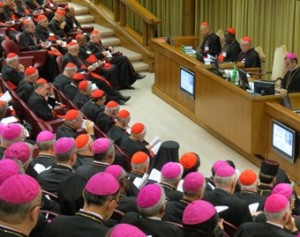Previous posts in this series can be found here (part 1) and here (part 2).
Pope Francis and Evangelii Gaudium
If the “new evangelization” has become the definitive terminology and vision of the Catholic Church’s mission today, how is the papacy of Pope Francis shaping this ongoing conversation about the relationship between evangelization and works of charity and social justice? Evangelii Gaudium offers a clue. The fourth chapter is given over to a reflection on the social dimension of evangelization. Interestingly, Pope Francis quickly connects the terms “evangelization” and “liberation” in this discussion:

“Evangelization is meant to cooperate with this liberating work of the Spirit. The very mystery of the Trinity reminds us that we have been created in the image of that divine communion, and so we cannot achieve fulfilment or salvation purely by our own efforts. From the heart of the Gospel we see the profound connection between evangelization and human advancement, which must necessarily find expression and develop in every work of evangelization” (178; emphasis mine).
The relationship between evangelization and charity is a theme dear to Pope Francis. Pope Francis suggests a fundamental link between the preaching of the Gospel and the promotion of human life in all of its expressions: “The kerygma has a clear social content: at the very heart of the Gospel is life in community and engagement with others. The content of the first proclamation has an immediate moral implication centred on charity.” (177).
Moreover, he points to work for social justice as a key test of a “faith which is authentic,” since genuine faith “always implies a profound desire to change the world” (183). Interestingly, on this point he again does not steer away from connecting evangelization and liberation as concepts: “Each individual Christian and every community is called to be an instrument of God for the liberation and promotion of the poor, and for enabling them to be fully a part of society” (187). Continue reading

